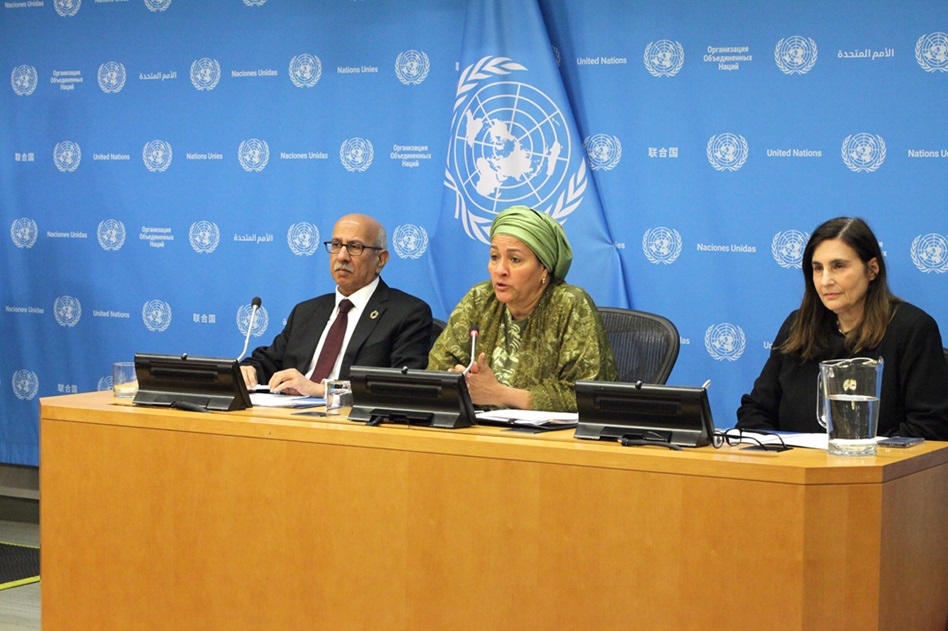
By Atayi Babs
A new UN report today says financing challenges are at the heart of the world’s sustainable development crisis – as staggering debt burdens and sky-high borrowing costs prevent developing countries from responding to the confluence of crises they face. Only a massive surge of financing, and a reform of the international financial architecture can rescue the Sustainable Development Goals.
The 2024 Financing for Sustainable Development Report: Financing for Development at a Crossroads (FSDR 2024) says urgent steps are needed to mobilise financing at scale to close the development financing gap, now estimated at USD 4.2 trillion annually, up from USD 2.5 trillion before the COVID-19 pandemic. Meanwhile, rising geopolitical tensions, climate disasters and a global cost-of-living crisis have hit billions of people, battering progress on healthcare, education, and other development targets.
“This report is yet another proof of how far we still need to go and how fast we need to act to achieve the 2030 Agenda for Sustainable Development,” said UN Deputy Secretary-General Amina J. Mohammed.
“We are truly at a crossroads and time is running out. Leaders must go beyond mere rhetoric and deliver on their promises. Without adequate financing, the 2030 targets cannot be met,” she added.
With only six years remaining to achieve the SDGs, hard-won development gains are being reversed, particularly in the poorest countries. If current trends continue, the UN estimates that almost 600 million people will continue to live in extreme poverty in 2030 and beyond, more than half of them women.
“We’re experiencing a sustainable development crisis, to which inequalities, inflation, debt, conflicts and climate disasters have all contributed,” said UN Under-Secretary-General for Economic and Social Affairs Li Junhua.
“Resources are needed to address this, and the money is there. Billions of dollars are lost annually from tax avoidance and evasion, and fossil fuel subsidies are in the trillions. Globally, there is no shortage of money; rather, a shortage of will and commitment,” Li added.
According to the report debt burdens and rising borrowing costs are large contributors to the crisis. Estimates are that in the least developed countries debt service will be USD 40 billion annually between 2023 and 2025, up more than 50 per cent from USD 26 billion in 2022.
Stronger and more frequent climate related disasters account for more than half of the debt upsurge in vulnerable countries. The poorest countries now spend 12 per cent of their revenues on interest payments — four times more than they spent a decade ago. Roughly 40 per cent of the global population live in countries where governments spend more on interest payments than on education or health.
While investment in SDG sectors had grown steadily in the early 2000s, major sources of development funding are now slowing down. For example, domestic revenue growth has stalled since 2010, especially in LDCs and other low-income countries, in part due to tax evasion and avoidance. Corporate income tax rates are falling, with global average tax rates down from 28.2 per cent in 2000 to 21.1 per cent in 2023, due to globalization and tax competition.
Meanwhile, Official Development Assistance from OECD countries and climate finance commitments are not being met. While ODA increased to an all-time high in 2022, reaching USD 211 billion, from USD 185.9 billion in 2021, much of the growth came from aid to refugees living in donor countries, and the total amount is inadequate for development. Only four countries met the UN aid target of 0.7 per cent of GNI in 2022.
The report concludes that the international financial system, which was set up at the 1944 Bretton Woods Conference, is no longer fit for purpose. It proposes a new coherent system that is better equipped to respond to crises, scales up investment in the SDGs especially through stronger multilateral development banks, and improves the global safety net for all countries.
The report points to the UN Summit of the Future in September 2024 as a crucial opportunity to change course. It highlights the June 2025 Fourth International Conference on Financing for Development (FfD4)as the critical moment for countries to commit to closing the development financing gap and invest in achieving the SDGs.
FfD4 is an opportunity for countries to:
- Close credibility gaps and rebuild trust in multilateralism.
- Close financing and investment gaps, at scale and with urgency.
- Reform and modernize the outdated international financial architecture and adjust international rules for trade, investment and finance.
- Formulate and finance new development pathways to deliver on the SDGs and ensure no one is left behind.
“Without global cooperation, targeted financing, and, crucially, the political will, the world will not achieve the SDGs,” said Deputy Secretary-General Mohammed.










